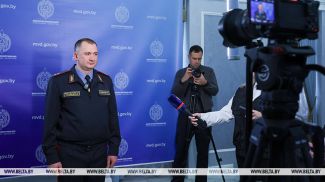MINSK, 27 May (BelTA) – Belarus is dedicated to the Sustainable Development Goals and green economy principles. Belarusian Natural Resources and Environmental Protection Minister Andrei Khudyk made the statement during the roundtable session held on 27 May to share the best practices and discuss national strategies and projects in the area of ecology and environmental protection, the press service of the Natural Resources and Environmental Protection Ministry told BelTA.
The official said: “Belarus is dedicated to the Sustainable Development Goals and green economy principles. It is confirmed by the international commitments the country has undertaken and a number of strategic documents that have been passed. The national strategy on sustainable social and economic development till 2035 specifies strategic directions in the area of sustainable development. Its goal is to achieve inclusive steady green growth in all spheres of life of the society.”
The achievement of the main goals of the national strategy will allow reducing greenhouse gas emissions to 38% by 2035 and increasing the share of surface water bodies with good and excellent ecological statuses to 100%. Apart from that, the intensity of industrial waste generation per GDP unit will drop and the area of disturbed soil will be reduced by 72% (from 3,600ha as of 1 January 2020 to 1,000ha by 2035). The program on Belarus' social and economic development in 2021-2025 identifies industry ecologization and the development of the circular economy as the necessary conditions for achieving long-term goals.
More than ten strategies have been developed and are being implemented in all the areas of work of the Belarusian Natural Resources and Environmental Protection Ministry. Those include a water strategy, strategies on the preservation and steady usage of biological diversity, preservation and rational usage of peat lands, the development of the system of nature reserves. National action plans have been worked out on many of the strategies, the natural resources and environmental protection minister stressed.
Andrei Khudyk pointed out that green civil engineering focuses on energy-saving solutions, smart home technologies, including the construction of houses that heavily rely on electricity. Projects have also been implemented to restore drained peat lands, protect landscape diversity and biological diversity, and neutralize persistent organic pollutants in environmentally friendly ways. Priorities of development of the green economy in Belarus till 2025 include the development of electric transport and urban mobility, the development of power engineering, including new kinds of environmentally pristine energy, steady consumption and manufacturing, innovative green and digital technologies, steady ecological tourism.
According to the source, it is now important to properly implement a joint international technical aid project, which envisages the development of ecological tourism for the sake of assisting with green transition to inclusive and sustainable growth. Pilot facilities for the next three years will be the nature reserves Krasny Bor and Osveisky, which border on the Russian national park Sebezhsky.
The reduction of usage of disposable plastic is another strategic direction of cooperation in the sphere of green technologies and environmental protection. The adoption of Belarus-developed amendment No.4 to the Customs Union's technical regulation on the safety of packaging is expected to be an effective measure. Public hearings of the amendment are in progress on the website of the Eurasian Economic Commission from 20 April through 23 June 2021. It is important for the Eurasian Economic Union member states to work out a common stance on the matter, which will allow combining integration efforts to create and use green technologies and models of the circular economy. It will help establish uniform mandatory requirements for products and create an effective mechanism to protect the common market from goods, which are not safe for the environment, the Belarusian natural resources and environmental protection minister said.













